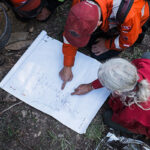Home »

Columbia Basin youth and young professionals unite Feb. 11
With the USA and Canada getting close to an agreement for a ‘modernized’ Columbia River Treaty, time is running out for youth and young professionals to share their concerns for the river.
To unite young stakeholders (age 16-35) across the Columbia River Basin, the North American Youth Parliament for Water will hold the Youth Forums for the Columbia River on February 11.
Registration is open and free, but closes 6 Feb. This event serves as a platform for youth to raise their voice for the Columbia River in advance of the United Nations 2023 Water Conference in March and what may be the closing phase of the Treaty negotiations.
This hybrid event will be a synchronized series of conversations for youth and young professionals to collect, organize, and empower themselves as water stakeholders during the current renegotiation of the Columbia River Treaty.
The Youth Forums for the Columbia River is one of several regional events selected by the Global Youth Movement for Water to mobilize young people to action on the water crisis ahead of the UN 2023 Water Conference. The event is generously funded and supported by the International Secretariat for Water, Government of the Netherlands, the Swiss Confederation, and has co-funding from the Oregon Institute of Water and Watersheds and the Sierra Club. The Oregon State University Hydrophiles, University of British Columbia-Okanagan campus and Wildsight are also supporting student participation in this event.
The Columbia River Treaty of 1964 is a central governing document of the basin between the USA and Canada.
The two countries began reviewing the treaty for changes around 2010 and began formal negotiations in May 2018. If a new agreement is not reached by September 2024, significant portions of the treaty will automatically shift from a more robust system of international coordination to an uncertain ad-hoc system.
The treaty modernization process is an opportunity for both governments to re-examine the terms and priorities governing the transboundary Columbia River Basin. The terms of the initial 1964 treaty created disastrous impacts on the ecosystem of the Columbia River Basin while prioritizing hydroelectric power development and engineered flood control through a series of dams on the Columbia and the smaller rivers that support it.
The collapse of salmon populations and the change in water available for irrigation also exacerbated tensions between Indigenous and settler communities in the basin.
The NAYPW has two years of previous work and connections in the Columbia River Basin through the pilot year of the Young Professionals Blue Peace Whitepaper Program. In 2020, NAYPW hosted a Young Professional’s Blue Peace Workshop on the Columbia River Basin in partnership with Oregon State University.
The methodology of the workshop was uniquely designed by NAYPW leaders to enhance participants’ knowledge of how the Columbia River Basin is managed by offering a system thinking perspective and a new integrated outlook into established water management practices.
If you are interested in joining other youth and young professionals to voice your concerns for the Columbia River Basin, register to join the North American Youth Parliament for Water this February 11th.
For more information and further inquiries, please contact the North American Youth Parliament for Water at [email protected].
Lead image: Libby Dam in Montana. e-KNOW file photo
North American Youth Parliament for Water







